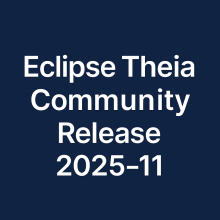Why Bloomberg Chose Vendor-Neutral Java Over Big Tech
Bloomberg's move to Eclipse Temurin shows why foundation governance and vendor independence matter more than ever in enterprise open source strategy.
Bloomberg's move to Eclipse Temurin shows why foundation governance and vendor independence matter more than ever in enterprise open source strategy.
At CES 2026, 32 automotive open source leaders signed last year's Memorandum of Understanding to collaborate on software-defined vehicles.
Late January in Brussels has become an important moment for anyone working at the intersection of open source and European regulation. For the ORC community, this week is particularly relevant. The Cyber Resilience Act (CRA) is moving from interpretation to implementation, and many of the conversations happening during this week focus on what that means in practice.
From ongoing releases and a redesigned website to the growing success of the Eclipse Temurin, 2025 was a year of growth, stability, and renewed commitment to delivering high-quality, open source Java runtimes to the world.
Initiative 31 is an evaluation project supported by the Eclipse IDE Working Group, focused on the long term sustainability of Eclipse SWT, the Eclipse Platform, and the products built on top of them.
As 2025 comes to an end, it is the right time to look back at how the Oniro Working Group has evolved. If the first half of the year was about exploration and setting up our tools, the second half has been about putting those tools to the test.
Over the past year, we have built greater clarity around the Cyber Resilience Act (CRA) and its implications for open source development.
Read the 2025 year in review by the Eclipse Foundation's security team, check Tim Kliefoth's committer profile article, and more.
As we steer towards the end of 2025, it’s amazing to look in the rear-view mirror and see just how far the Eclipse Software Defined Vehicle (SDV) community has travelled.
As we look back on 2025, it’s clear that this has been a year of remarkable growth and maturation for the ORC community. Our membership has expanded to 63 organisations, reflecting both the rising importance of open, collaborative security practices and the trust our stakeholders place in the work we are doing together.
Eclipse Theia 1.67 has been released featuring a new Terminal Manager, improved Theia AI onboarding, Claude Code session forking, new Slash Commands and enhanced debugging. Check out the full release notes to see what’s new in the latest monthly update.

As the EU Cyber Resilience Act (CRA) moves closer to the implementation deadline, software manufacturers across multiple verticals are beginning to understand its extensive implications for software security and compliance, which are now inseparable from innovation.
As the year draws to a close for the automotive sector and the wider software-defined vehicle landscape, two prominent thought leaders and Eclipse SDV Ambassadors, Filipe Prezado and Martin Schleicher, share a clear view of what 2026 will hold for SDV technology, architecture, adoption, and industry readiness.
ボッシュは12月12日、業界の壁を越えたコラボレーションが鍵となるSDV(ソフトウェアデファインドビークル)の実現に向けた各種取り組みや最新情報について、オープンソースソフトウェア関連のプロジェクトを運営する団体であるEclipse SDVの担当者も招いて解説する報道関係者向けの「SDV勉強会」を開催した。
The Eclipse Theia Community Release 2025-11 is now available and delivers native Claude Code IDE integration, persistent AI chat sessions, new GitHub and Project Info agents, and numerous platform improvements.

Learn about the development of Theia AI and what developer problems it helps solve in this interview with Jonas Helming.
As we wrap up 2025, it’s remarkable to look back at how far the ORC community has come since January. What started as a year shaped by uncertainty transformed into one defined by collaboration, expertise-sharing, and a rapidly growing ecosystem.
Haishi Bai shares his journey in open-source innovation, his impact on projects like Eclipse Symphony, and the passion-driven mindset guiding his work.
Explore the journey of Eudris Cabrera and the impact of open source in the Caribbean on communities and opportunities.
Company Unites Global Automotive Leaders to Drive Open-Source Innovation and Streamline SDV Development, Leveraging Proven Platform Expertise and Leadership